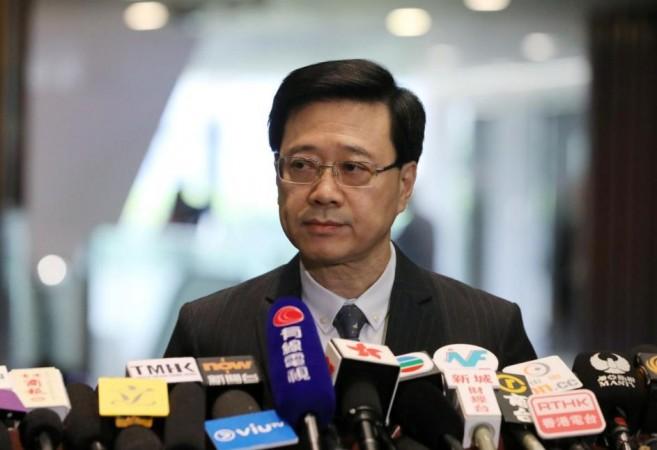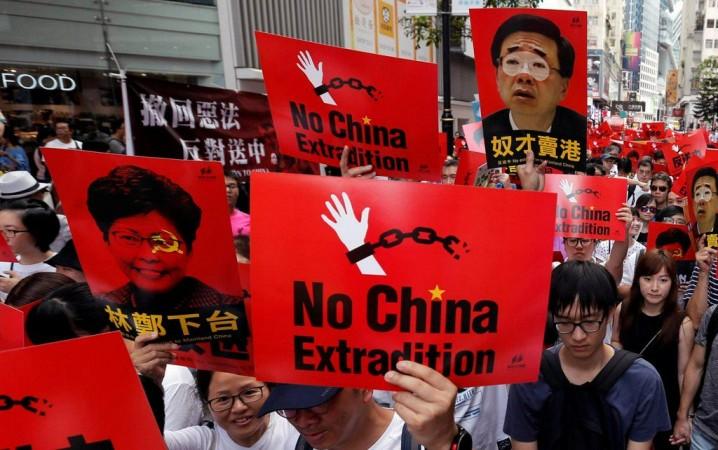Hong Kong on Wednesday, October 23, officially withdrew the controversial extradition bill that proposed to provide China easy access to pursue their political targets residing in the city and led to months of pro-democracy protests.
The Secretary of Security John Lee Ka-Chiu announcement was, however, one out of the five demands sought by activists and lawmakers. The five demands are - the bill's withdrawal, an independent investigation into police brutality, to stop describing the protests as "rioting", Hong Kong leader Carrie Lam's resignation from the governing body and resuming political reform.
While Lam had announced plans of withdrawing the extradition law in September, reports suggest protesters demand "five demands, not one less" from lawmakers, indicating the government's efforts to appease the demonstrators are from over.
"There aren't any big differences between suspension and withdrawal (of the extradition bill)... It's too little, too late," Connie, a protestor was quoted as saying by Reuters. "There are still other demands the government needs to meet, especially the problem of police brutality."
The protest that began in June was primarily for full withdrawal of the proposed extradition bill that would allow China to pursue their political targets residing in the city ruled by the communist regime.

However, the protests developed into a major political movement against Beijing's clampdown on freedom of independent judiciary and the right to protests that have threatened Hong Kong's sovereignty.
Lam has been severely criticised for agreeing to hold dialogues and listen to the demonstrators but refusing to officially withdraw the bill. Critics have said that her repeated usage of the term "dead"instead of "withdrawal" while referring to the bill indicates legal manoeuvres through which the bill could be revived in the future.
The original extradition case
Lam had cited the case of a Hong Kong man who had committed crimes in Taiwan as an example for going forth with the proposed extradition law. However, the case took an interesting turn over the past weeks after Chan Tong-kai offered to voluntarily surrender himself to Taiwan.
Chan was accused of murdering his girlfriend in Taiwan and fleeing to Hong Kong last year. He was arrested by Hong Kong police on March 2018 and was charged for money laundering. Having found no evidence related to the murder, he was sentenced to 29 months in prison for the money-related fraud.
On Wednesday, he walked free as political tensions between Hong Kong and Taiwan continued to escalate.
"There's no such thing as surrender," Taiwan President Tsai Ing-wen said. "There's only arrest... We will continue to ask for legal assistance from the Hong Kong government, including providing related evidence and to ask the Hong Kong government not to evade the matter."

Hong Kong's Secretary for Security John Lee accused Taiwan of obstructing the case. The widespread protests insitilled fear in Hong Kong with rising fear that the growing poltical leanings towards Beijing will threaten the "one country, two systems" formula.
Lam recived severe criticim for introducing emergency laws to ban face masks. With Lam's increasing unpopularity in Hong Kong, according to the latest report by the Financial Times, Beijing is likely appointed an "interim" chief replacing Lam.
The report states Lam's successor would be appointed by March 2020 and the new executive leader would cover the remainder of Lam's term.
However the report is suggested to be false as the suggested candidates listed; Norman Chan, the former head of the Hong Kong Monetary Authority, Henry Tang former financial secretary; do not match the requirements according to Hong Kong's Basic Law, officials told Reuters.
China's foreign ministry also slammed the FT report and called it a 'political rumour with ulterior motives.'

















